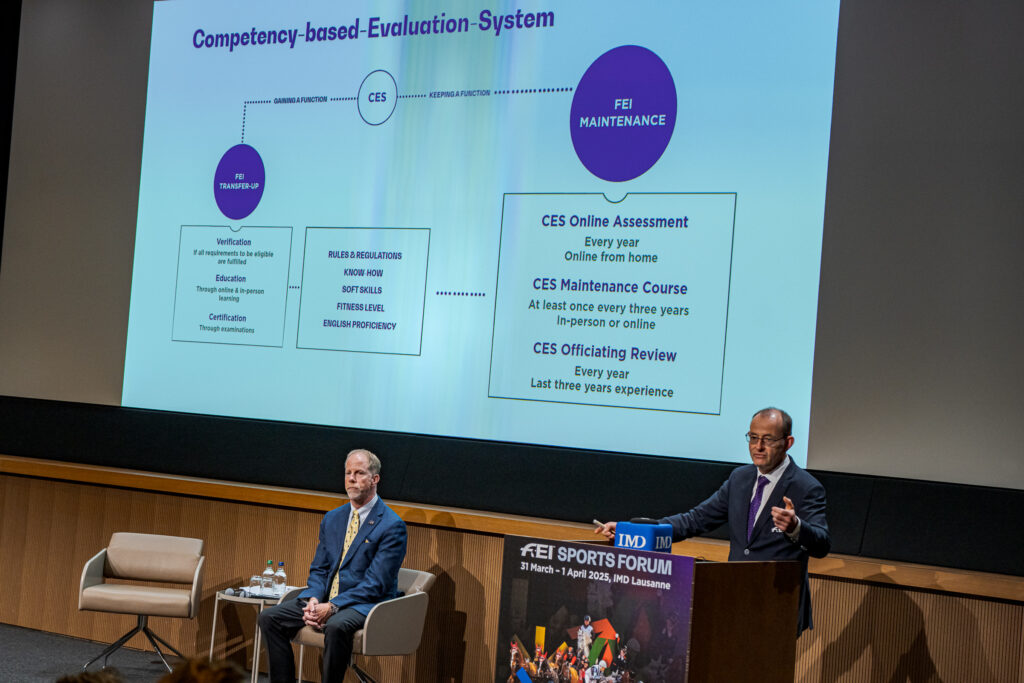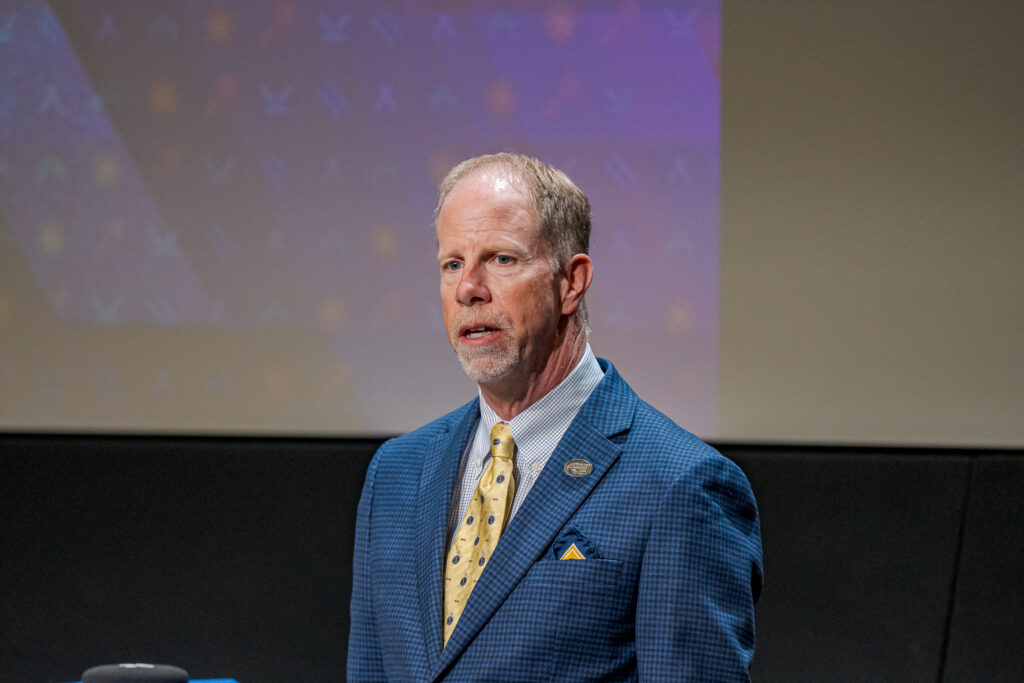The last session of the FEI Sports Forum 2025 focused on the findings of the Officials Working Group.
The Group has reviewed a large amount of data including surveys on Officials and National Federations, statistics on FEI Officials as well as statements made by the various disciplines on the FEI Competency-based Evaluation System (CES) Officiating Review, appointment of Officials, Officials rotation system and evaluation of Officials.
The session was presented by Mark Samuel, Chair of the FEI Officials Working Group and Frank Spadinger, the FEI Director of Education and Officials Department.
Mark Samuel starting the presentation, taking over after Sabrina Ibanez.

The final session of the FEI Sports Forum 2025 turned the spotlight on the lifeblood of equestrian sport: its Officials. Presented by Mark Samuel, Chair of the FEI Officials Working Group, and Frank Spadinger, FEI Director of Education and Officials Department, the session offered a deep dive into the complexities of officiating and the hurdles the FEI faces in maintaining a robust, fair, and sustainable Officials system.
Reactivated by the FEI Board in June 2024, the Working Group was tasked with evaluating the Competency-Based Evaluation System (CES), examining survey data, and reviewing concerns raised across disciplines and regions. The renewed urgency stemmed from a stark simulation of the current system: over 25% of functions reviewed from the past three years failed to meet the required number of officiating assignments, particularly impacting developing regions (Groups III–IX).
Key Figures from the Surveys
- 1,373 Officials participated in the FEI survey out of 5,227 invited
- The average age of respondents was 65 years old
- 56% reported difficulty gaining officiating experience
- 52% said their National Federations provide no financial support for CES Maintenance Courses
- 63% of Officials had to officiate in more than three national events in 2024 to stay active
For National Federations, the challenges were equally pronounced: 46 NFs responded to a parallel survey, with many citing difficulty recruiting young Officials, lack of educational structure, and financial constraints.
Recurring Issues
The presentation highlighted a recurring set of issues shared by Officials and NFs alike:
- Expensive and logistically difficult in-person Maintenance Courses, especially for those in remote regions
- Lack of transfer-up opportunities and mentoring systems
- Rotation of Officials remains inconsistent and underdeveloped, despite strong support for it in theory
- Heavy reliance on a small pool of experienced Officials, particularly in Europe and North America
- Lack of standardisation and real-world applicability in current CES training content
Proposed Adjustments
The Working Group is proposing several changes:
- A clearer, graduated system of CES requirements depending on official level (1–4)
- Online alternatives for Maintenance Courses to lower costs and increase access
- Stronger use of mentoring, shadow judging, and peer review to support evaluation and transfer-up
- A digital evaluation database and better IT tools for tracking rotation and assignments
- More appointments at Level 2 competitions to widen experience and visibility
Full presentation containing a lot of stats from survey
FEI Official press release

Voices from the Floor
The closing discussion reflected a wide mix of regional concerns and practical insight from the FEI community. Jack Huang, FEI Board member and Chair of Regional Group 8, raised a recurring issue from his region:
“Many times I’ve tried to apply for a course, but there are no available course directors. Is this also happening in other regions?”
Frank Spadinger acknowledged the gap, especially in certain disciplines, and outlined efforts to train new course directors, emphasizing consistency and investment in mentorship.
An official from the International Jumping Official School asked whether Maintenance Courses might be spaced out over a longer period — for example, every six years instead of three — in some disciplines. This suggestion was welcomed as part of the review of CES timelines and access burdens.
Another delegate voiced support for developing a future IT system for appointments and rotation, saying:
“A logical distribution of assignments will help more than the current system. We support anything that increases fairness and clarity.”
There was also concern raised about cross-discipline stewarding: a steward from eventing warned that assigning officials across jumping and non-jumping roles risks undermining discipline-specific knowledge. FEI representatives clarified that such cross-listing would only apply to maintenance requirements, not active officiating, and would only be possible for officials already qualified in multiple areas.
Finally, Jerry from Hong Kong shared personal experiences:
“I just hope some of these challenges can be considered — like preparation time, travel limitations, and real-world differences between regions. We need more tools, but also more flexibility.”
The tone was constructive and solutions-oriented, with wide support for using mentoring, digital tools, and regional adjustments to create a more accessible and sustainable officiating pathway.
Looking Ahead
The Officials Working Group will continue consulting with disciplines and veterinary departments through 2025, with final proposals expected ahead of the General Assembly. Their goal: a rebalanced, modernised officiating system that nurtures talent while ensuring fairness, accessibility, and integrity across the sport.
As Mark Samuel concluded: “We must future-proof officiating. The challenges are real, but so is the opportunity to evolve.”
